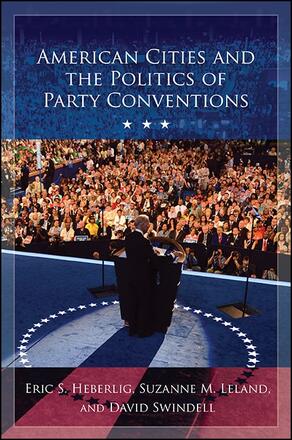
American Cities and the Politics of Party Conventions
Alternative formats available from:
Uncovers the politics involved when a city recruits and implements a presidential convention.
Description
Political party conventions have lost much of their original political nature, serving now primarily as elaborate infomercials while ratifying the decisions made by voters in state primaries and caucuses. While this activity hasn't changed significantly since the 1970s, conventions themselves have changed significantly in terms of how they are recruited, implemented, and paid for. American Cities and the Politics of Party Conventions analyzes how and why cities advance through the site selection process. Just as parties use conventions to communicate their policies, unity, and competence to the electorate, cities use the convention selection process to communicate their merits to political parties, businesses and residents. While hosting such a "mega event" provides some direct economic stimulus for host cities, the major benefit of the convention is the opportunity it provides for branding and signaling status. Combining a case studies approach as well as interviews with party and local officials, Eric S. Heberlig, Suzanne M. Leland, and David Swindell bring party convention scholarship up to date while highlighting the costs and benefits of hosting such events for tourism bureaus, city administrators, elected officials, and the citizens they represent.
Eric S. Heberlig is Professor of Political Science and Public Administration at the University of North Carolina at Charlotte and coauthor (with Bruce A. Larson) of Congressional Parties, Institutional Ambition, and the Financing of Majority Control. Suzanne M. Leland is Professor of Political Science and Public Administration at the University of North Carolina at Charlotte and coeditor (with Kurt Thurmaier) of City-County Consolidation: Promises Made, Promises Kept? David Swindell is the Director of the Center for Urban Innovation and Associate Professor in the School of Public Affairs at Arizona State University.
Reviews
"This volume … adds meaningfully to the scholarly literature on convention effects by adopting an interdisciplinary perspective that extends beyond traditional analyses of this sort by considering how stakeholders select host sites and organize conventions, along with how these events affect host cities and their citizens. For readers seeking a refreshing take on convention effects, this book is a must-read. " — Congress & the Presidency
"This is a well-researched, well-written book that should be of interest to students of urban politics and political behavior. " — CHOICE
"Exceptionally well written, organized, and presented … extraordinarily informative. " — Midwest Book Review